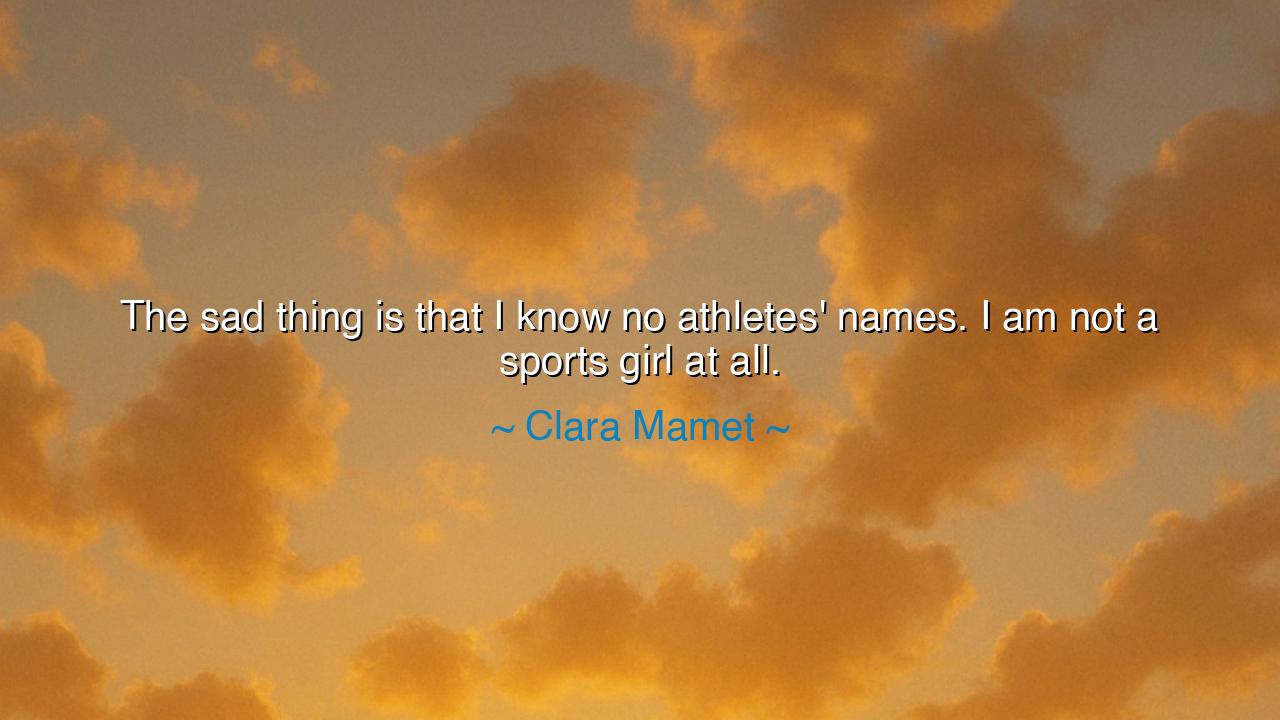
The sad thing is that I know no athletes' names. I am not a






Hear the words of Clara Mamet, spoken with candor and a trace of regret: “The sad thing is that I know no athletes’ names. I am not a sports girl at all.” At first, her confession seems lighthearted, a playful admission of disinterest in a realm that captivates millions. Yet beneath her words lies a greater truth about human life: that each soul is drawn to certain paths and blind to others, and that what is sad to one may be liberation to another. For the human heart cannot embrace all the fields of endeavor, and every choice leaves something behind.
The ancients knew this lesson well. They spoke of the muses—divine daughters who each bestowed a gift: one for music, another for poetry, another for dance, another for history. Rarely did one person serve all the muses; rather, they devoted themselves to the art that called them most strongly. So too with Clara Mamet: she is not called by the muse of the stadium, by the names of heroes who contest with strength and speed. Instead, her spirit inclines elsewhere—toward art, words, and story. Yet she calls it sad, for she knows that in turning away from the field, she loses something of the fellowship that binds so many.
History offers us examples of this same divide. Consider Emily Dickinson, the poet who seldom left her home. While the world outside glorified generals, politicians, and public figures, she lived inwardly, knowing few names of champions or conquerors. Some might call this sad, that she missed the roar of life’s contests. Yet her retreat gave birth to poetry that touched eternity. In her choice to neglect one realm, she gained mastery in another. Clara Mamet’s words echo this paradox: that to confess ignorance in one field may be to quietly affirm devotion to another.
And yet, the sadness she names should not be ignored. For though each person must choose a path, it is wisdom to honor the achievements of others, even if their craft is not our own. To know at least a few of the great athletes’ names is to know the stories of perseverance, discipline, and glory that inspire the human spirit across cultures. Just as an artist may learn courage from a warrior, or a philosopher may learn endurance from a farmer, so too may the writer learn determination from the athlete. To close one’s heart completely is to miss the lessons hidden in lives different from one’s own.
Still, Mamet’s admission is powerful in its honesty. She does not pretend interest for the sake of fashion. She does not mouth the names of champions she does not care for. She remains true to her own calling, even if it leaves her seemingly apart from the crowd. In this there is also strength: the courage to say, “This is not my world,” while still acknowledging what others love. To be authentic is better than to wear a mask, even if authenticity sometimes feels lonely.
The lesson for us is clear: each soul must find its own passion, but must also honor the passions of others. You need not become a sports girl, a scholar, a musician, or an athlete if that is not your calling—but you may learn from them, respect their triumphs, and share in their stories even from afar. In this way, you do not forsake your own gifts, but enrich them by recognizing the greatness in others.
Practical action follows: if you know nothing of a certain realm—whether of athletes’ names, or of music, or of science—seek to learn at least a little. Not to master it, but to broaden your respect for the tapestry of human endeavor. And in your own field, pour yourself fully, so that when others confess ignorance of your world, your work will still stand as a beacon they can admire. For in the end, the sadness of not knowing is balanced by the joy of truly belonging to one’s chosen path.
Thus, Clara Mamet’s words, though simple, are a mirror for us all. No one can embrace every field, nor master every story. To live is to choose, and to choose is to leave something behind. Let us therefore walk our chosen roads with integrity, honor the roads of others with respect, and accept with humility that the fullness of human greatness cannot be known by one person alone, but only by all together.






AAdministratorAdministrator
Welcome, honored guests. Please leave a comment, we will respond soon